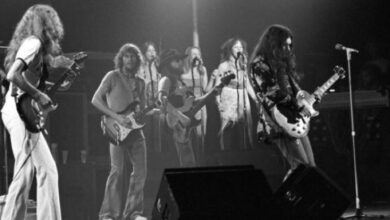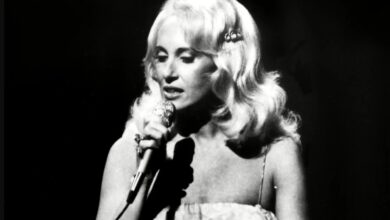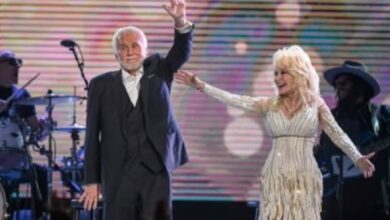The Shadows are together again — watch them tear into Apache like old times
The Shadows, often considered one of England’s most defining rock and roll bands, have long carried a legacy that extends beyond simply being Cliff Richard’s backing group. While many casual fans associate them primarily with Richard’s early career, their true influence on popular music is far greater. From their distinct instrumental sound to their pioneering approach to guitar-driven melodies, The Shadows carved out a unique place in music history. Their story is one of innovation, perseverance, and timeless artistry.
In the late 1950s, they were first known as The Drifters, a name that suited their restless creative energy but soon brought confusion. Across the Atlantic, the American soul group The Drifters was already climbing the charts with hits like “There Goes My Baby.” To avoid legal clashes and identity crises, the English group wisely rebranded themselves as The Shadows. That change would prove fateful, cementing a name that still resonates decades later.
The Shadows backed Cliff Richard from 1958 through 1968, becoming an essential part of his early success. Songs like “Move It” and “Living Doll” introduced Richard to international audiences, and behind him stood the steady presence of The Shadows. Their tight musicianship, precise harmonies, and ability to fuse rockabilly with homegrown British charm made them indispensable. Yet, even as they played in Richard’s shadow, the band’s own artistic light was impossible to contain.
By 1960, The Shadows broke through in their own right with “Apache,” a track that would become one of the most famous instrumental hits of all time. Written by Jerry Lordan and first attempted by Bert Weedon, it was The Shadows’ version that captured the imagination of an entire generation. Their rendition transformed a relatively simple tune into something cinematic, haunting, and unforgettable. It was not just a song—it was a cultural moment.
The BBC 4 documentary “The Shadows at Sixty,” released in 2020, captures the magnitude of this achievement. Bringing the band together to reflect on their journey, the film blends nostalgia with insight, painting a portrait of musicians who shaped the sound of modern guitar rock. Through interviews, archival footage, and live demonstrations, the documentary illustrates how The Shadows were not merely Cliff Richard’s side project but architects of their own musical empire.
One of the most powerful moments in the film comes when the band revisits “Apache.” Walking into their old rehearsal space, the musicians seem to slip effortlessly back into the roles they played decades earlier. The chemistry is instant, as though no time has passed. Their laughter, camaraderie, and instinctive understanding of each other’s playing reveal why their music has endured. It’s a reminder that genuine artistry doesn’t fade with time.
Hank Marvin, their legendary lead guitarist, becomes the focal point when he strikes up the unmistakable opening riff of “Apache.” Even after sixty years, the tone, phrasing, and clarity remain as captivating as ever. Marvin’s guitar style—characterized by clean melodies, expressive vibrato, and an unmistakable twang—helped define what the electric guitar could be in rock music. His influence has reached beyond the UK, inspiring artists across Europe, America, and even Asia.
In fact, Marvin’s impact on future generations of guitarists cannot be overstated. From George Harrison of The Beatles to Mark Knopfler of Dire Straits, countless icons have cited The Shadows as formative influences. Their ability to make the guitar the lead voice, rather than a background instrument, shifted the entire direction of rock and pop. “Apache” was not just a song; it was a blueprint for guitar-driven music to come.
The Shadows’ importance also lies in how they shaped the identity of British rock before the “British Invasion” of the mid-1960s. Before The Beatles, before The Rolling Stones, The Shadows were already crafting a sound that was distinctly British yet globally appealing. They demonstrated that English musicians could create hits without simply mimicking American styles. This confidence paved the way for later bands to storm international charts with originality.
“Apache” itself carried a mystical, almost cinematic quality that set it apart from the bubblegum hits of its era. With its dramatic melody and atmospheric arrangement, it felt like a soundtrack to an unwritten Western film. Its resonance with listeners was immediate and enduring, as the song topped charts in the UK and found popularity worldwide. Decades later, it remains instantly recognizable—a testament to the band’s genius.
The Shadows were not only innovators but also consummate performers. Their stage presence combined professionalism with a quiet charm, earning them admiration from fans who appreciated their artistry without theatrics. While others relied on showmanship and flamboyance, The Shadows let their music speak for itself. This approach, while understated, only enhanced their reputation as musicians’ musicians. They commanded respect through skill and integrity.
The 2020 documentary highlights this authenticity. Seeing the group return to familiar spaces and recall old memories underscores how their music was born from genuine connection and hard work. Unlike many acts that fade into nostalgia alone, The Shadows prove their relevance simply by playing. The sound of “Apache” in that rehearsal room is as powerful today as it was in 1960, bridging generations through melody and memory.
It is important to note that while Cliff Richard’s fame often overshadowed their story, The Shadows’ independent career was remarkable. They recorded numerous albums, influenced surf rock, and helped popularize instrumental music at a time when vocals dominated. Their success showed that instrumental tracks could captivate the public just as much as lyrical ones. That achievement alone set them apart from their contemporaries.
The endurance of The Shadows’ music also speaks to the timeless appeal of melody. In an age of rapid musical change, “Apache” and other hits stand as reminders that simplicity, when crafted with care, can achieve immortality. Hank Marvin’s guitar lines, Bruce Welch’s rhythm, and the tight rhythm section created music that was both sophisticated and accessible, embodying the perfect balance for mass appeal.
Ultimately, The Shadows’ legacy cannot be confined to footnotes in Cliff Richard’s career. They were trailblazers, innovators, and artists in their own right. The BBC documentary affirms this by allowing them to reclaim their narrative, to show not just where they came from but why they still matter. As Hank Marvin plays those iconic notes, fans old and new are reminded that The Shadows remain eternal in the story of rock and roll.



